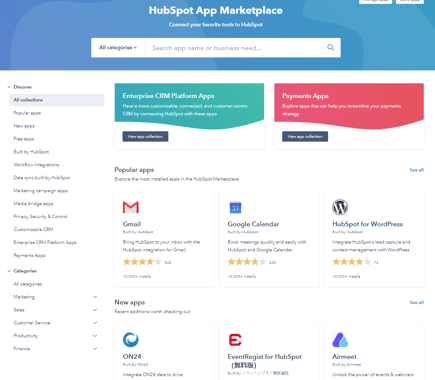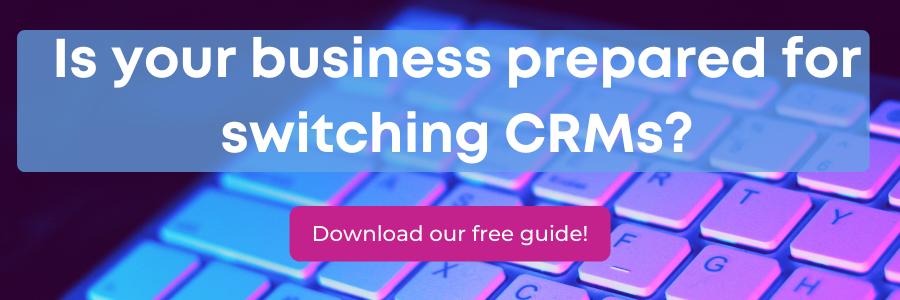HubSpot vs. Salesforce: Which CRM Should you Choose?
.png)
Whether or not you’ve heard of us here at SpiderConnect you’ll soon get to know that we’re huge HubSpot fans. But this doesn’t mean we blindly recommend everyone and everybody to HubSpot.
We know that there are times when HubSpot absolutely will be the best CRM for you. We also know there are times that you could be suited better to another CRM. Like Salesforce, for example.
If you’re not sure which CRM is best for you, read on and see which CRM suits your business needs the best.
What is HubSpot CRM?
HubSpot is a leading customer relationship management software, which also does a pretty neat job of managing your marketing, sales, and customer service at the same time.
.png?width=620&name=clv%20cac%20(7).png)
It‘s fully equipped to provide you with all of the tools you need for your company to grow. These tools can be broken down into its Marketing Hub, Sales Hub, Service Hub, CMS Hub and Operations Hub.
What is Salesforce CRM
Salesforce has been around a long time. In fact, it was actually one of the first cloud computing companies about. Salesforce is well renowned for its exceptional functionality. It also has applications for sales, marketing, and customer service to provide you a system to bring your company and customers together.
.png?width=620&name=clv%20cac%20(8).png)
What is the Difference Between HubSpot and Salesforce?
One key difference in the experience you get between the two cloud-based CRMs is that HubSpot was built in-house on one code base. What does this mean if you don’t speak code?
This means it was effectively built from the ground up. A fully unified experience, that’s outrageously intuitive for you and your team. And we don’t only mean being able to use, but to truly harness the power and start seeing results in your business.
A harmonious experience for everyone in your organisation from customer service, to sales, marketing and dev. Your one stop shop.
In contrast, Salesforce was built and grown through a combination of acquisitions - this means there is less affinity between the products within the platform. This doesn’t mean it’s any less effective, just that the learning curve can be a little steeper or require a little more expertise before you really start seeing the value.
Let’s explore the other differences between Salesforce and HubSpot.
Dashboards and Reporting
Both CRM platforms have strong reporting capabilities. This is obviously extremely important - analysing your customer data allows you to better target, nurture, and convert your leads.
Both systems come with out-of-the-box reports set-up. This is great if you’re new to dashboards and reporting. However, Salesforce does offer more granular and detailed views, allowing you to visualise your reports as you wish - be that pie charts, funnels, or odometers. You need to upgrade to HubSpot’s premium reporting package to unlock these features.

So, if you upgrade does HubSpot match Salesforce when it comes to reporting? Not quite. While it may be more tricky to set up, the customisation offered by Salesforce definitely trumps HubSpot’s reporting. That being said, HubSpot reporting is easy to use, in-depth and provides large amounts of quality insights for your business.
It’s worth thinking about how granular you want to be in your reporting, and how much time and resource you have to work on your analytics. For the majority of businesses, HubSpot’s reporting will be enough, and it’s quicker and easier to you. If your reporting needs are complex, Salesforce is likely to win for you.
Integration
When you're a business that uses a bunch of different tools and services to function daily, it’s important for these tools to integrate well. Otherwise, you can end up spending hours flitting between multiple platforms and software, trying to get your data from one place to another.
Both HubSpot and Salesforce are really strong platforms when it comes to their range of integrations. With HubSpot’s App marketplace you have access to over 500 out-of-the-box integrations that are easy to setup and get going with straight away.
Salesforce users also have access to a similar platform – the AppExchange, with over 3,000 apps and integrations. PieSync works with both CRM platforms and makes it much easier to integrate your tools.


Automation
If you’re yet to jump on the automation bandwagon, it should be well on your radar! Automation is playing a more and more important role in business. Salesforce’s automation software is called Einstein and uses artificial intelligence to help you work smarter.
HubSpot users also benefit from a strong and comprehensive automation feature with workflows allowing you to build triggers based around any contact, company, deal or ticket value.
The HubSpot workflow platform is sophisticated, while also being extremely user friendly. It’s a win-win. Where’s the drawback? Some of the automation features are only available to those on the Enterprise Plan.
User Experience
From the marketing tools to the sales pipeline, to the customer support. HubSpot will please everyone at your organisation from your account managers to your sales team. It has a truly intuitive interface, teamed with a really great support team and knowledge base.

The ease of HubSpot means even your least tech savvy members of staff will be able to take advantage of the powerful features. You won’t require technical or dev support to get set up or build out the platform how you want. And if you do need help, their support team offer an always on hand service either via email or chat, or over the phone to assist you with anything you may be struggling with.
When it comes to Salesforce, the user experience is definitely less friendly. It’s most likely you’ll require tech and dev support, as well as needing to learn a lot in a short space of time. But if you are among the tech savvy or have a team able to support you, Salesforce is a powerful platform, and you shouldn’t be put off by its more difficult to grasp interface.
Cost
A main difference between HubSpot and Salesforce is that HubSpot offers a free CRM option. This makes HubSpot a great option for small businesses, or businesses that might be exploring for the first time how a CRM could be beneficial.
The free package still offers great functionality, with many of the same features as paid plans, but with limits on different features. For example, if you’re on the free plan - you’re limited to 2,00 marketing email sends per month. Once you start paying for HubSpot, you also get the freedom to remove their branding, adding in your own.
Salesforce differs from HubSpot in that you pay per user, per month. For their most basic platform this is £20 per user, per month. This scales all the way up to £240, with the most popular package being the Enterprise sitting at £120 per user, per month.
Can HubSpot Replace Salesforce?
Definitely. HubSpot can absolutely replace Salesforce and, depending on where your priorities lie with your CRM requirements, it could be a great business choice for you. When it comes to support, collaboration, and cost HubSpot is superior for a huge number of businesses.
The integration between the two platforms also makes migrating relatively simple - and HubSpot support or a HubSpot partner can help make this process as seamless as possible. It’s not the quickest process though - check out our resource on CRM Migration to see what it entails and what you can expect.
Which is Easier for a Start-up to Use, Salesforce or HubSpot?
When we talk about start-ups, we tend to make a few assumptions. You have a relatively small number of employees, you don’t have a huge amount of cash flow, and will definitely choose wisely where you spend it, and you don’t necessarily have a department for each business function.
This last point is what makes HubSpot a great option for a start-up. HubSpot’s extremely friendly user experience and level of intuitiveness means you don’t need to be a technical whizz to be able to unlock the functionality.

HubSpot is innately better for users who are new to CRM software, looking to up their marketing, or are seeking a free package. The suitability of HubSpot to small businesses that are after a CRM system that will be easy to use, is definitely more apt than Salesforce.
However, what Salesforce lacks here, it certainly makes up for in its functionality for large businesses and multinational corporations. If you are a large company seeking a lot of features, you may find that Salesforce will suit your business needs better.
So, Which is Better: HubSpot or Salesforce?
As you have probably worked out, there is not one fixed answer. Some businesses actually use both! As is often the way, cost can play a large role in your decision, especially for smaller businesses. But don’t be fooled into thinking the cheaper option is subpar in any respect. Check out the great results one of our clients got when they implemented HubSpot.
Where you may have a lack of expertise in your organisation, HubSpot will be the easier choice. This doesn’t mean that if you choose to use Salesforce you won’t be able to get to grips with its powerful functionality - it might just take you a little longer to get up and running.
Sign up for our newsletter to receive updates on new features and releases.
